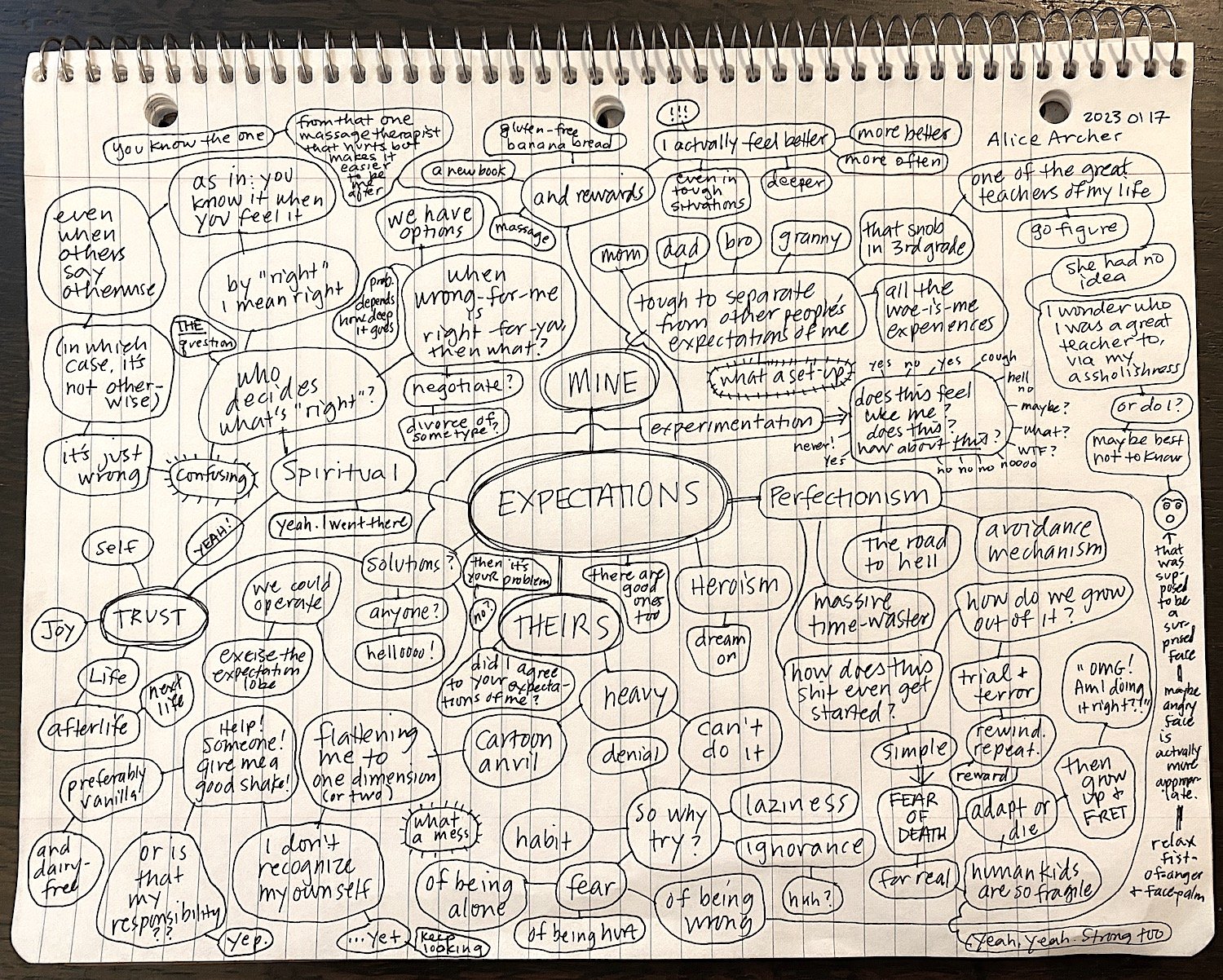EXPECTATIONS Explored in a Cluster Map
Real life occurs in the ongoing, sweat-soaked wrestling match between competing expectations. Do you know the feeling of really wanting to do something that someone else really wants you not to do? Or the situation where you say what you think and someone else tells you that’s not right? Or how about when one part of you has always done something this way, but another part of you wants to try doing it that way for a change?
In my favorite romance novels, the main characters journey through a process of sorting through their internal and external expectation clashes to arrive at clear space and aligned decisions. This is a journey worth experiencing. The process is much more than a romance lesson—it’s a life lesson about the positive effects of managing expectations.
Gnarly work, to be sure. Easier said than done.
Recently, I’ve been navigating a growth spurt. New opportunities, new lessons, new self-view. Call it a clash of old stories and new stories around what it means to be me. Over and over, I notice that unless I do the gritty work of picking through the assumptions in play, updating my assumptions, and taking action based on the new expectations I have for myself, I tumble back onto the mat with a penalty. Progress does happen, mostly when I take action to speak and behave from my updated stance. Terrifying.
This mental thicket of expectation-sorting prompted me to try a cluster map as a way to externalize and make sense of the jumble. I love how doing a cluster map lightens the mood. As the circles and arrow spontaneously pop up and string together, humor usually enters the scene, which always helps. I inevitably gain a wider, higher, more patient perspective. This time was no different. Here’s how my EXPECTATIONS cluster map turned out:
The biggest revelations came from connecting expectations to perfectionism and trust, which are also connected to each other, since (in my experience) the urge to perfectionism indicates a lack of trust. Whenever I get bogged down in trying to make something perfect—a goal I’ll never achieve—I’m trying to avoid trusting because trusting is scary.
Self-trust, trust in others, trust in life itself all found more of a home inside me as I spun out the circles of the cluster map and felt the links accrue. A cluster map in itself represents a type of trust—a visual net of sorts, a meaningful strainer to lay out the truth while everything else slips through to fade in the white of the paper. Every time I do the challenging work of creating a cluster map, I end up caught and held, safer and quieter and wiser.
Another surprise appearance in this cluster map was the girl who shocked me in third grade with a throwaway comment she made in passing and surely forgot two minutes later, but that pierced my tender heart. Like, whoa—she is still up there in my cranial spaces enough to spurt out on a cluster map? Although, it figures that she’d show up here, because that piercing in third grade caused an abrupt adjustment of my expectations. I remember the caught-breath feeling of shock. I even remember the dress I was wearing, one my mom had made, a brown thing with beige embroidery down the front.
When I reexamine that incident in third grade from a perspective of assumptions and trust and the endless work of loving what is, I realize how much I’ve learned since then about sticking up for myself. In my mind’s eye, I stand behind the girl I was and gently pull her against my knees to comfort her, bend down to whisper in her ear, “You and your generosity, sweetheart, are the cat’s pajamas.” She turns and wraps her skinny arms around me, and I lift her to the safer shores of today.
A lot else snuck into this particular cluster map: dairy-free milkshakes, gluten-free banana bread, a massage therapist, a cartoon anvil, afterlife, and a sly face-palm. I was having fun by the end and felt better. My hope is that some piece of this cluster map will spark a gentling of your expectations for yourself, a strengthening of your willingness to stand up for yourself, or a chuckle.
===
Alice Archer is the author of Everyday History and The Infinite Onion, thought-provoking romance novels for strong hearts. You can subscribe to her newsletter to receive a free story, notification of new articles and books, and more. Alice is also a writing coach as Grace Kerina.
Read more about Cluster Maps, Living True, The Romance Genre

